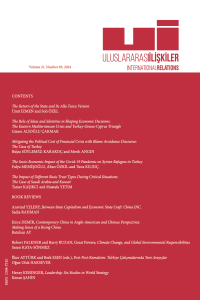Emre DEMİR, Contemporary China in Anglo-American and Chinese Perspectives: Making Sense of a Rising China, (New York, Routledge, 2023)
Abstract
Keywords
References
- - - - - - - - - -
Emre DEMİR, Contemporary China in Anglo-American and Chinese Perspectives: Making Sense of a Rising China, (New York, Routledge, 2023)
Abstract
In the book Contemporary China in Anglo-American and Chinese Perspectives: Making Sense of a Rising China, Emre Demir aims to analyze China’s rise by displaying the differences and similarities in scholarly discourse in Western and Chinese scholarship. The book examines a collection of 14 approaches from scholars of mainstream United States (U.S.), critical Western, mainstream Chinese, and critical Chinese approaches and seeks to reveal their relevant power-knowledge nexuses and region-centric characteristics in knowledge production, with a particular focus on the current power structure in knowledge production in Chinese and U.S. societies. Demir indicates that every approach occupies a position within the three-layered structure of knowledge production: core, semi-periphery, and periphery. Currently, the U.S. assumes the core (hegemonic) position within social sciences knowledge production, which enables it to dominate the means of knowledge production and direct the ways in which knowledge is produced. Therefore, the U.S. can globally reproduce its own theories, which it benefits from, under the guise of universal validity. Moreover, Demir advocates the diversification of intellectual knowledge in the social sciences, a human-centric approach instead of a region-centric one, a focus on the colonial histories of societies, and the decolonization of International Relations (IR).
Keywords
References
- - - - - - - - - -
Details
| Primary Language | English |
|---|---|
| Subjects | International Politics |
| Journal Section | Book Review |
| Authors | |
| Early Pub Date | February 9, 2024 |
| Publication Date | August 27, 2024 |
| Published in Issue | Year 2024 Volume: 21 Issue: 83 |

